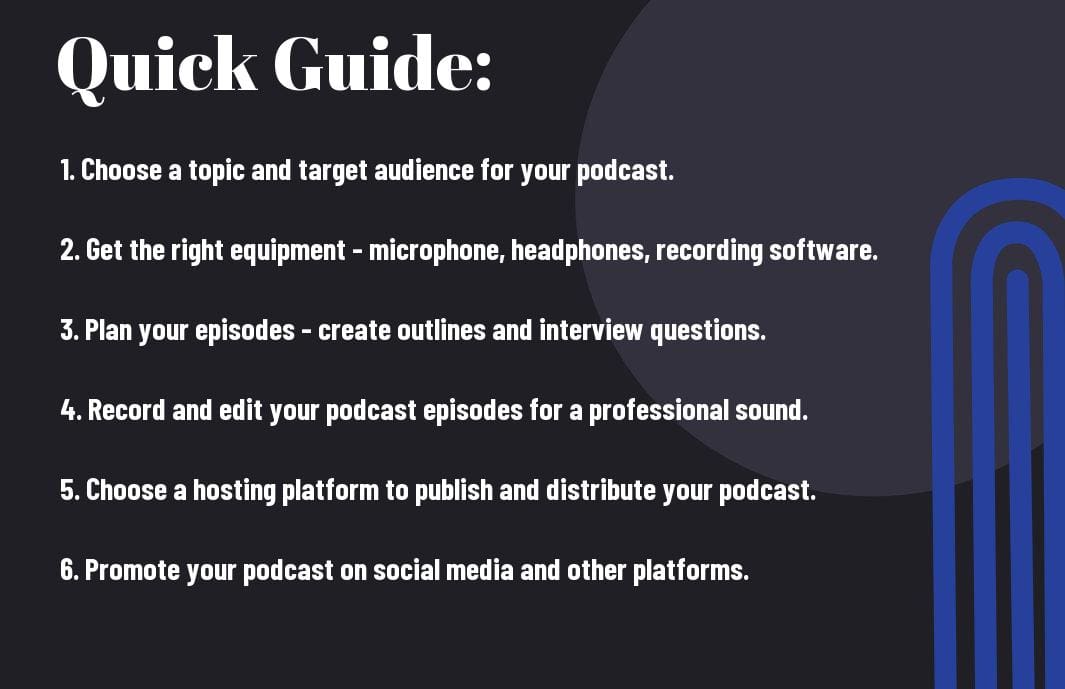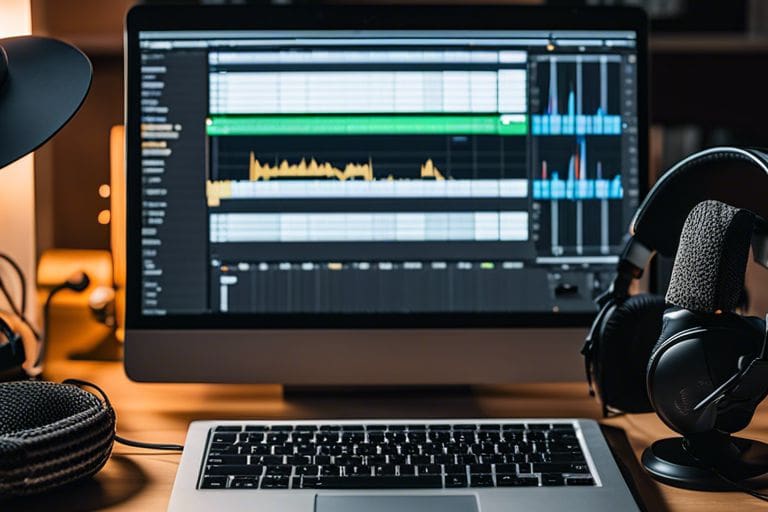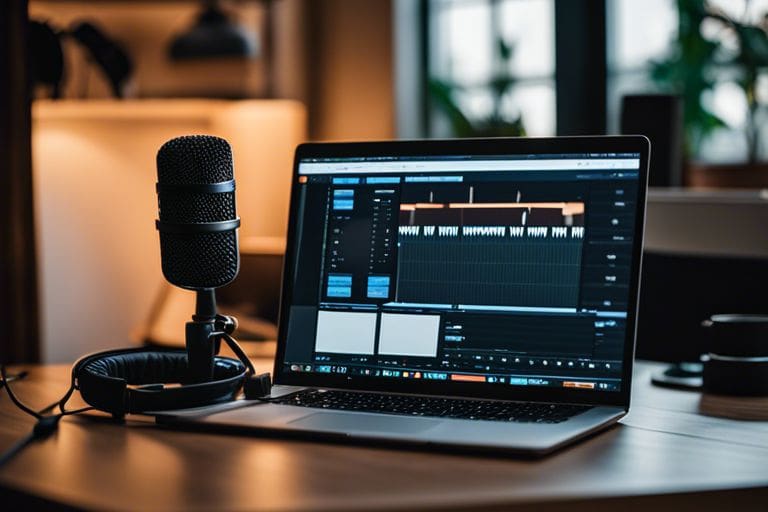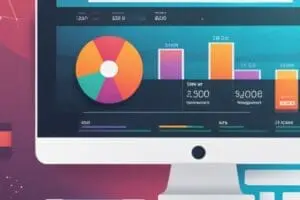There’s never been a better time to probe the world of podcasting with the growing popularity of this versatile medium. This comprehensive guide will walk you through the necessary steps needed to start your own podcast from scratch, including choosing the right equipment, recording and editing techniques, hosting options, and ways to promote your podcast. Whether you’re a novice looking to share your passion or a business wanting to reach a wider audience, this beginner’s guide will help you navigate through the exciting world of modern podcasting seamlessly and efficiently.
Key Takeaways:
- Choose a topic and format: Select a niche that interests you and define your podcast format whether it’s interview-style, solo discussions, storytelling, or a mix.
- Invest in quality equipment: Acquire a good microphone, headphones, and audio recording/editing software to ensure professional sound quality for your podcast.
- Promote your podcast: Utilize social media, collaborations with other podcasters, and platforms like Apple Podcasts and Spotify to reach a wider audience and grow your listener base.

Types of Podcasts
Some podcasts are created in different formats to cater to a wide range of audiences. Main keywords to consider are interview podcasts, solo podcasts, storytelling and serialized podcasts, and educational and informational podcasts. Assume that each type offers a unique listening experience tailored to specific preferences.
| Interview Podcasts | Solo Podcasts |
| Storytelling and Serialized Podcasts | Educational and Informational Podcasts |
Interview Podcasts
Little a glimpse into the lives and thoughts of fascinating individuals, interview podcasts are a popular choice among listeners. Hosts engage in conversations with guests from various fields, offering insights, stories, and valuable information.
Solo Podcasts
Some podcasters prefer to go solo, discussing topics, sharing experiences, or expressing opinions without a co-host. This format allows for complete creative control and a personal connection with the audience. To maintain engagement, solo podcasters often rely on storytelling, Q&A sessions, or expert monologues.
Storytelling and Serialized Podcasts
Clearly distinguished by their narrative approach, storytelling and serialized podcasts captivate listeners with engaging plots, character development, and cliffhangers. It creates a sense of anticipation and encourages binge-listening. It allows creators to unfold a larger story over multiple episodes, keeping the audience hooked.
Educational and Informational Podcasts
Podcasts dedicated to education and information serve as valuable resources for listeners seeking to expand their knowledge on various subjects. Understanding new concepts, trends, or facts becomes easily accessible through expert-led discussions, in-depth analysis, and informative content. These podcasts provide a convenient and engaging way to learn on-the-go.

Step-by-Step Guide to Starting Your Podcast
Despite the growing popularity of podcasts, many people are still unsure of how to start their own podcast. With the right tools and guidelines, launching a successful podcast can be easier than you think. Follow this step-by-step guide to kickstart your podcasting journey.
| Planning Your Podcast | Recording Your First Episode |
Planning Your Podcast
Assuming you have a concept in mind for your podcast, the first step is to define your target audience and niche. Determine the format of your episodes, the frequency of release, and the length of each episode. Create a content calendar to stay organized and plan your topics in advance. Research your competition to identify gaps in the market that your podcast can fill.
Recording Your First Episode
Starting your podcast journey with your first episode is crucial. Invest in a quality microphone and recording software to ensure professional sound quality. Find a quiet space to record, free from background noise. Prepare a script or outline to guide your episode, but allow room for natural conversation and spontaneity. Keep in mind, quality content and engaging delivery are key to capturing and retaining your audience’s attention.
Important Factors in Podcasting
Not everyone realizes that there are key factors to consider when starting a podcast. To ensure a successful podcast, it is important to focus on the following:
- Choosing the Right Equipment
- Selecting Hosting and Distribution Platforms
- Creating Engaging Content
- Promoting Your Podcast
After considering these factors, you’ll be on your way to a successful podcasting journey.
Choosing the Right Equipment
The equipment you use for your podcast is crucial for the quality of your content. Investing in a good microphone, headphones, and audio recording software can make a significant difference in how your podcast sounds to your listeners. It is important to research and test different equipment to find what works best for your specific needs.
Selecting Hosting and Distribution Platforms
To ensure your podcast reaches a broad audience, you must select the right hosting and distribution platforms. The platform you choose should offer a reliable hosting service with adequate storage and bandwidth. It should also distribute your podcast to major platforms such as Apple Podcasts, Spotify, and Google Podcasts. Right hosting and distribution platforms can help you reach a larger audience and grow your podcast effectively.
Tips for Successful Podcasting
After setting up your podcasting equipment and recording your first episodes, it’s time to focus on how to make your podcast a success. As a beginner, content creation and consistency are crucial for building a loyal audience and growing your podcast. To achieve success in podcasting, follow these key tips.
Content Creation and Consistency
Clearly define your podcast’s niche and target audience to create content that resonates with them. Consistency is key – establish a regular posting schedule to keep your audience engaged and coming back for more. Plan your episodes in advance and ensure they offer value, entertainment, or education to your listeners.
Audience Engagement and Growth Strategies
For audience engagement and growth strategies, interact with your listeners through social media, email newsletters, and podcasting platforms. Encourage feedback, reviews, and sharing of your episodes to increase visibility and attract new listeners. Collaborate with other podcasters or influencers in your niche to reach a wider audience and organically grow your podcast following.
Successful podcasting requires dedication to creating high-quality content, engaging with your audience consistently, and leveraging growth strategies to expand your reach and impact.
The Pros and Cons of Podcasting
All aspiring podcasters should be aware of the various advantages and challenges that come with starting a podcast. Below, we have outlined the pros and cons of podcasting in an organized manner:
| Pros | Cons |
| Low entry barrier | Requires time commitment |
| Wide reach and accessibility | Competition in the podcasting space |
| Builds a loyal audience | Monetization can be challenging |
| Establishes authority and credibility | Technical hurdles |
| Flexibility in content creation | Consistent content creation |
Advantages of Starting a Podcast
Starting a podcast offers numerous benefits, including a low entry barrier and the opportunity to establish authority and credibility in your niche. Podcasting also allows for wide reach and accessibility, enabling you to connect with a global audience and build a loyal following over time.
Challenges and How to Overcome Them
While podcasting presents exciting opportunities, it also comes with its set of challenges. To overcome these hurdles, it’s important to dedicate time to consistent content creation, tackle technical issues head-on, and explore various monetization strategies. By staying resilient and adaptable, you can navigate through the competitive podcasting landscape and emerge successful.
Plus, it’s crucial to focus on building a strong brand and developing engaging content that resonates with your target audience. By staying consistent in your efforts and continuously improving your podcasting skills, you can overcome challenges and thrive in the dynamic world of podcasting.
Conclusion
Conclusively, “Modern Podcasting Made Easy – A Beginner’s Guide To Starting A Podcast” lays out a comprehensive roadmap for individuals looking to launch on their podcasting journey. By covering crucial topics such as choosing the right equipment, recording techniques, editing software, and hosting platforms, this guide equips beginners with the necessary knowledge to kickstart their podcasting venture. With the rising popularity of podcasts, this guide serves as an invaluable resource for anyone looking to create and share their unique content with the world. Podcasting may seem daunting at first, but with the right guidance and approach, anyone can start their podcasting journey with confidence and ease.
FAQ
Q: What is modern podcasting?
A: Modern podcasting refers to the process of creating and distributing audio content over the internet. It has gained popularity as a form of digital media that allows individuals and businesses to share their thoughts, stories, and expertise with a global audience.
Q: Why should I start a podcast?
A: Starting a podcast can be beneficial for various reasons. It allows you to establish yourself as an expert in your field, build a community of like-minded individuals, and potentially generate revenue through sponsorships and partnerships.
Q: How can I start a podcast as a beginner?
A: As a beginner, you can start a podcast by following these steps:
1. Define your podcast concept and target audience.
2. Choose the right equipment and software for recording and editing.
3. Record and edit your episodes.
4. Publish your podcast on hosting platforms like Podbean or Libsyn.
5. Promote your podcast on social media and other channels to attract listeners.




